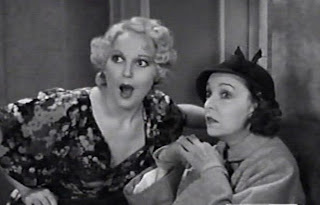Charley Chase, whose comedic talent as an actor and writer gives him a slapstick slant as director for this short film, which begins with a car chase. Zasu and Thelma -- they played themselves -- are rushing to get to a department store sale, and they knock over a traffic cop in their Model A in the process. A motorcycle cop gives chase -- through city streets, over trolley tracks, loses them when they drive down what appears to be a subway entrance below the sidewalk and finally catches up to them with a sarcastic,
“Pardon me, but could you spare me a moment of your time?”
The ladies get out of the car, Thelma half dragged by the cop played by James Burtis, and attempt to explain, flatter, and flirt their way out of a ticket. Thelma Todd, a beautiful, and typical platinum blonde of the era, is the more street savvy of the two. Zasu Pitts, while not exactly a dummy, is more naïve and passive, which makes it funny that Thelma is always urging Zasu to do the flirting so that she herself can make with the fast talk.
Zasu, whose on-the-surface expressions of worry, befuddlement, and wonder, as well as the warble in her voice and her repetitious “oh, dear!” will probably instantly remind you of Olive Oyl. There’s a reason for that. Mae Questel, the originator of Olive Oyl’s distinctive voice, was imitating Zasu Pitts.
Flirting is a tough chore for the well-meaning but socially inept Zasu, however she’s a game girl and does her job as best she can, with hilarious results. In real life, Miss Todd was about 12 years her junior, but in this series, the girls are shown as being contemporaries with Thelma Todd taking a protective manner over Zasu. To be sure, they are always there for each other.
They worm their way into the cop’s good graces when Thelma tells him Zasu is the daughter of the police superintendent. They were driving like maniacs because they desperately need to get to a department store sale to buy three sets of bed sheets. But, since the 67 cent-sheets are only one to a customer, the cop agrees to go along and by the third set for them.
Yes, he’s not that bright, but he’s a good egg.
The opening of the store reminds one of those horror stories of Wal-Mart opening early on Black Friday, with crowds trampling people to get in first. Fortunately, the only one trampled here is the store manager, so that’s okay. A couple of interns with a stretcher scoop him up.
There is some rib-tickling, punching, and close-quarter contact to wrestle the sheets from other customers -- and a cute spot where Zasu ends up cuddling a chubby fellow in an effort to reach around him, and he gives her his phone number:
“MEtropolitan4000, and ask for Elmer”.
But, the charade is over when the real police lieutenant shows up, and the cop is fired. In the interrogation, poor Zasu keeps getting referred to as a “palooka”.
The girls feel badly for causing the cop to lose his job. And, as they do pretty much in all their shorts, they turn their energies to helping those less fortunate. They take him into their home. When they trudge home from work, he is there in an apron, like a houseman, not a very good houseman, but somebody who earnestly tries to pay his way. He sets up a series of Rube Goldberg-type alarms to ward off intruders, because after all, they are girls living alone. A siren screams when they open their door. A Morris chair is rigged to dump a person on his head.
But, the cop is not a reliable cook, for all his inventiveness, and Zasu is sent to fetch some grub from the deli downstairs. Here she meets Billy Gilbert, dressed in a sea captain’s uniform.
Billy, eating a banana at the time, of course, tosses the banana peel on the ground, and Zasu takes a spectacular fall. Of the two ladies, Zasu appears to be the more athletic, and though she was something like 39 years old when this film was made, demonstrates the suppleness, though not the grace, of a 14-year-old Romanian gymnast.
Billy carries her back to the apartment. Since she thinks he is not a sea captain, but a police captain, she and Thelma hope to butter him up to get their cop friend his job back. Billy is invited to join them for ice cream.
But, since this is 1933, nobody heads for Ben & Jerry’s at the store -- Zasu is sent to the kitchen to make some. Meanwhile, the ex-cop, trying to entertain the guest, pulls the old “pretending to destroy the watch” trick, while the Billy Gilbert’s real watch gets mistakenly ground up by Zasu in the ice cream maker. They end up pulling bits of watch works out of their mouths with each spoonful of vanilla.
Though the ladies are backed up with all the elements of a Hal Roach production, and reliable character actors like Billy Gilbert, the charm of the duo is really their equal support of each other and their fellow man. Others got through the Depression with high adventure and sophisticated wit. These girls just stumble along until payday. For all the contrived boxing glove devices coming out of closets, this single motive makes them far more realistic than the grittiest Warner Bros. gangster movie.













